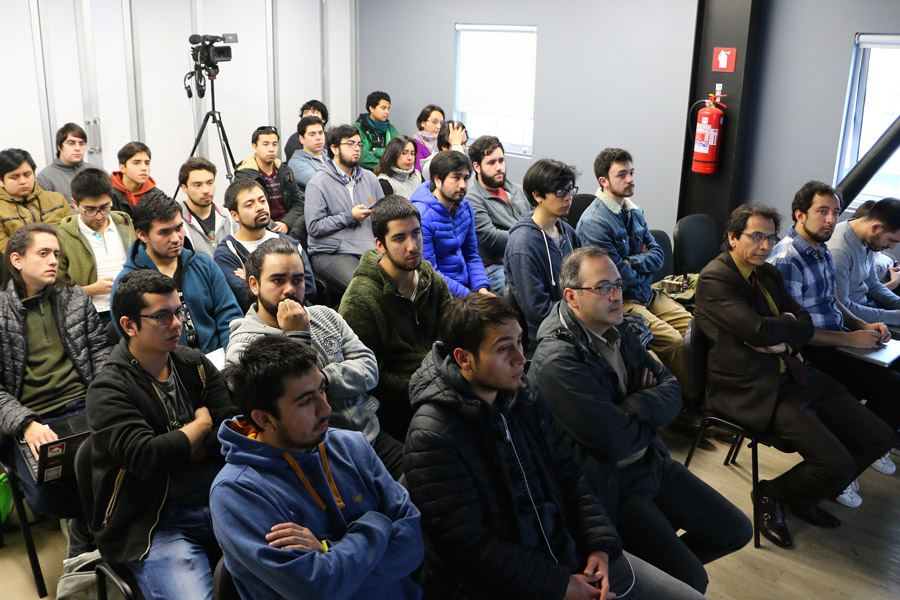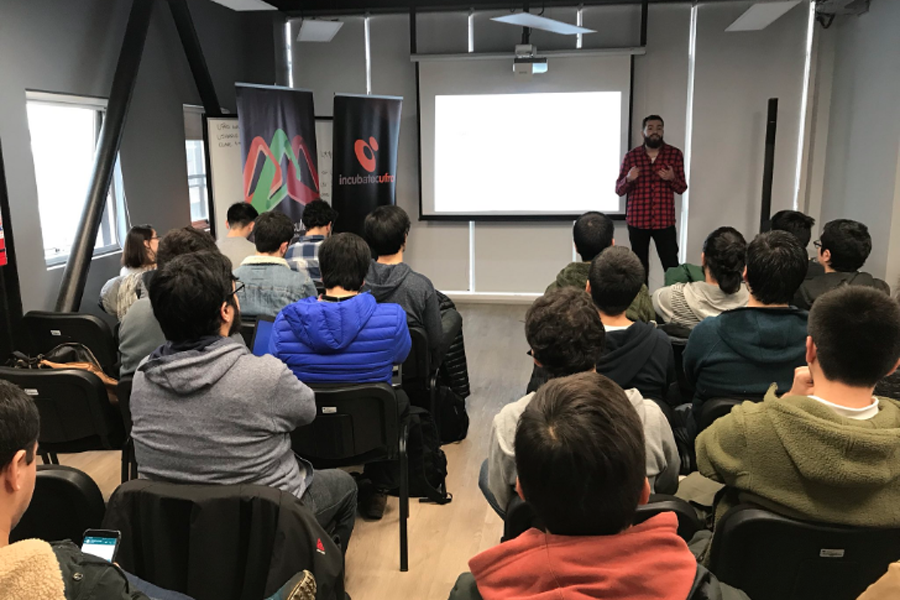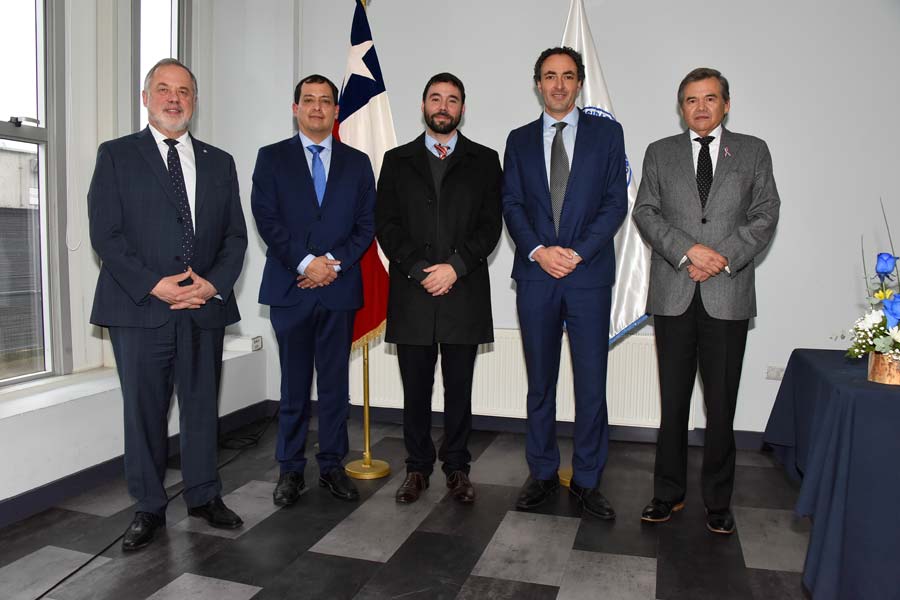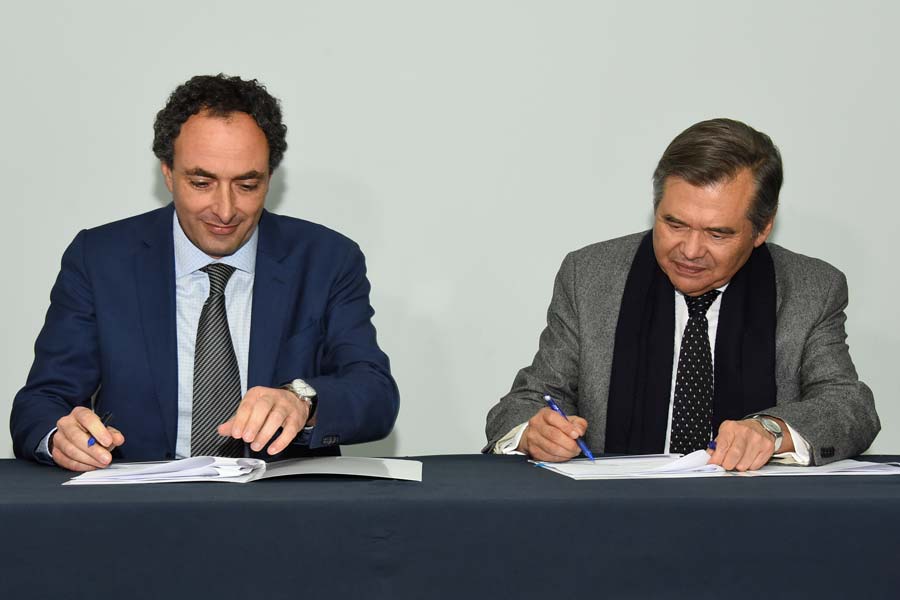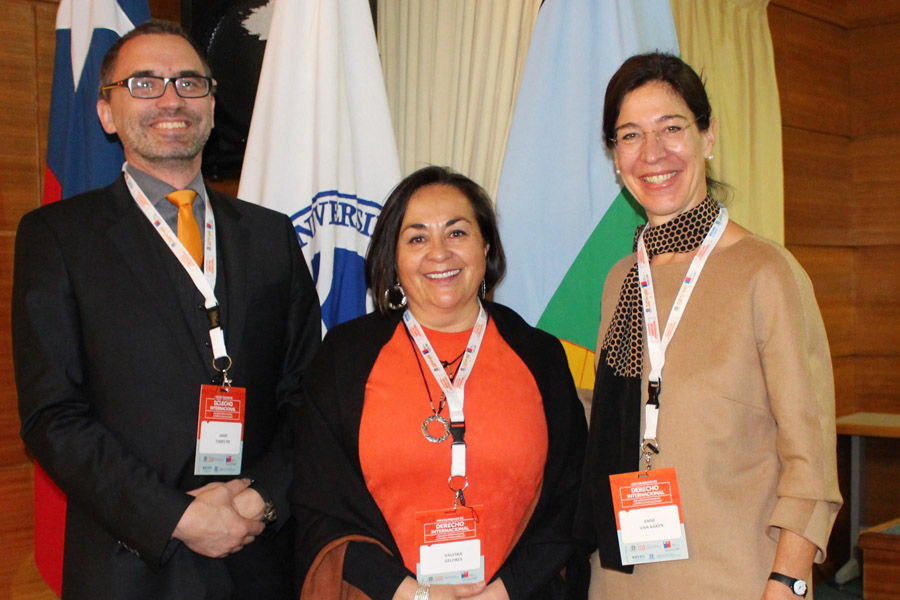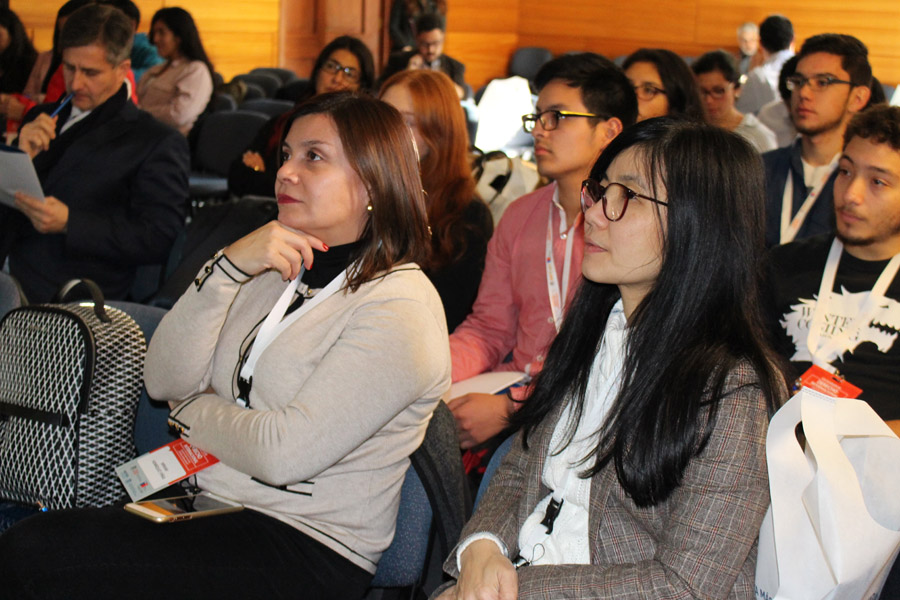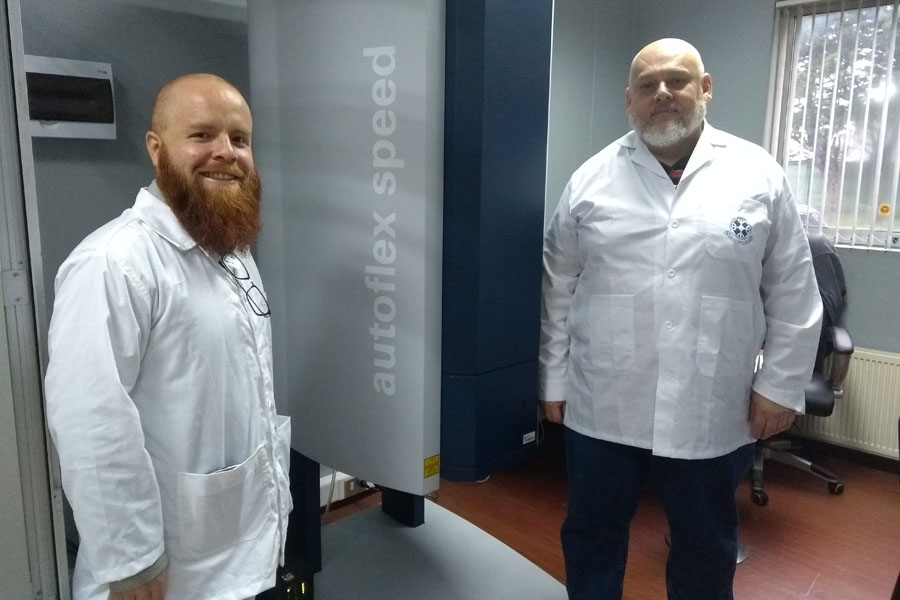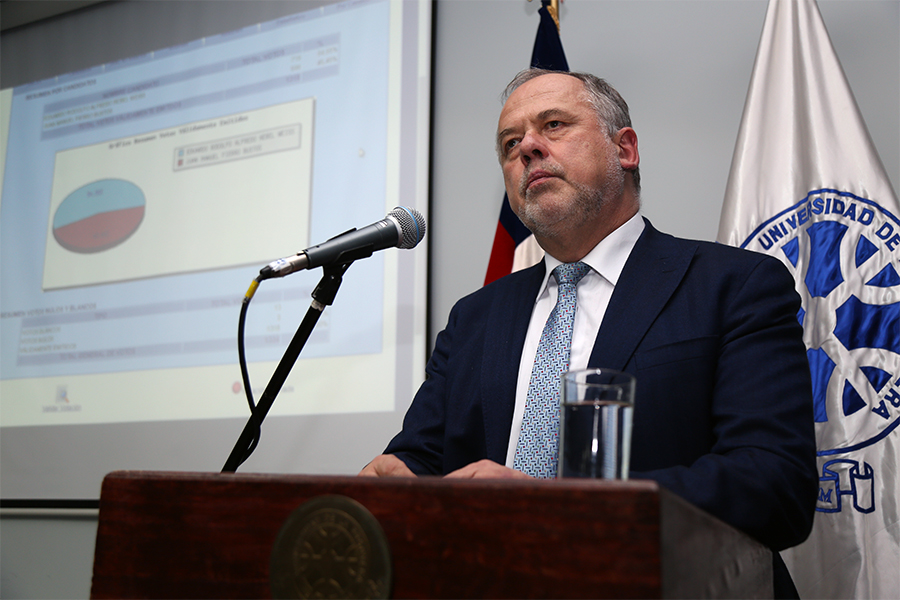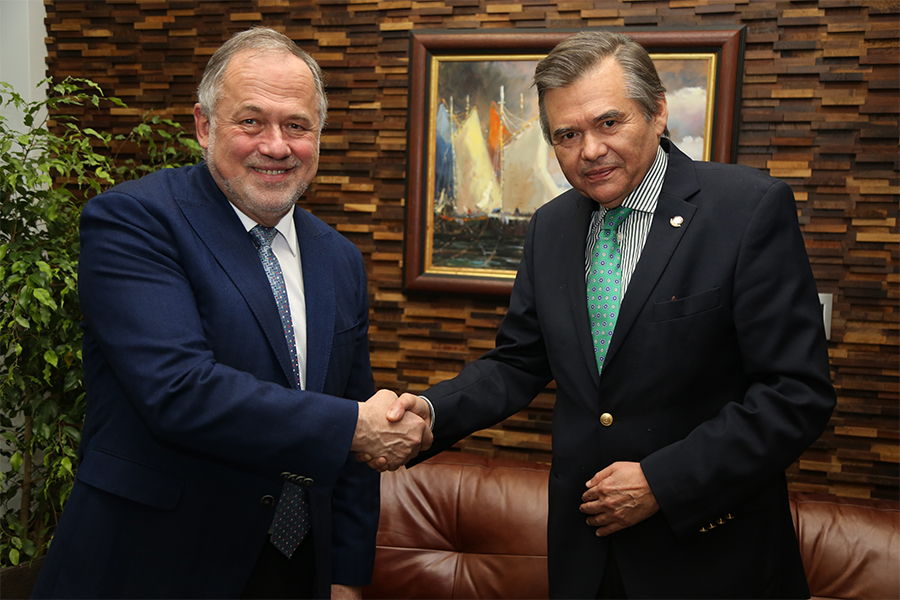|
The presentations have been organized by the Chilean MacroFaculty of Engineering and Incubatec UFRO. |
The UFRO started the series of presentations about emerging technologies in the field of engineering and science with a conference about computer security and digital identity, held by national and international specialists. The cycle “Emerging Technologies: Expectations and Implementations” has been organized by Incubatec and the Chilean MacroFaculty of Engineering. During 2018, the project contemplates ten presentations on the fields of development of the students at the UFRO Faculty of Engineering and Science, with entrepreneurs and experts in technology. “The idea of this series of conferences is to create the possibility for the students of the ten departments of our faculty to connect with outstanding entrepreneurs in the technological field regarding topics that are related to their careers,” the director of the MacroFaculty of Engineering, Gonzalo Bravo, explained. “We want to approach the students to innovation and entrepreneurship, with the help of young speakers who are becoming role models for them,” he said. The first conference took place at the Co-work room at the UFRO MacroFaculty, with presentations by the co-founder and Chief Information Security Officer (CISO) at Hackmetrix, Alejandro Parodi, and the director of Research and Development at Tocbiometrics.com, Javier Rodriguez. The specialists spoke about “Startup computer security” and “Digital identity” and held the workshop “Capture the flag”, in which the vulnerability of websites has been analyzed. “This can help the students to make companies safer. As software developers, they can create hardware codes or devices, based on the idea of proactive security. In general, this topic is left out and people only think about it after being attacked. That can affect the company and damage the image of the programmers,” he added. Meanwhile, the CEO of Hackmetrix, Adriel Araujo, claimed: “You have to know that an application is vulnerable when it has been programmed without the necessary validations or if the errors that permit hackers to enter the system have not been corrected. The first stage for security is when the programmer develops an application and it is important that he is conscious of that, because otherwise, there needs to be a tool for alert if a code is vulnerable.” The series of conferences continues on July 5th, with a conference and workshop about current technologies in the field of sensors, virtual reality and smart cities.
Written by: Mauricio Antivil
Engineering Project 2030 |
|
It is an historic partnership between the Chilean Society of Surgeons, the UFRO and the Pontifical Catholic University of Chile (PUC) that has been concreted on Friday, June 15th, with the signing of the agreement between the institutions what will permit a laparoscopic surgical training for physicians who are doing their specialization training at the UFRO. |
It is a high-impact agreement that has been sealed by the Universidad de La Frontera and the Chilean Society of Surgeons that will have a direct effect on patients in the region and will permit a better training for future surgeons, because with the equipment that is worth more than 100 thousand dollars, they can improve their work, what also consolidates the work in the postgraduate area of the Faculty of Medicine at the UFRO. The president of the Chilean Society of Surgeons, Dr. Nicolás Jarufe, said that this agreement will allow to specify a project for the implementation of these systems for less invasive laparoscopic surgery in the regions, in which future surgeons are trained, such as our institution in Temuco. “The UFRO has the capacity to receive this technology and the surgeons are able to get trained for the benefit of the patients,” Jarufe commented and added that during the first year, 10 physicians, who are doing their specialization training in surgery, will be trained, and also other specialization programs, such as gynecology and urology – in other words: the surgical specializations – will benefit. Sergio Bravo, the rector of the University, values the training with these simulators. The PUC already has experience with it and it is very important to bring it into the regions in order to being able to train specialists of excellence. “These are modern techniques that protect the patients and the equipment allows a training under similar conditions as in the training of pilots who work with simulators. So the surgeons can take flight hours in laparoscopic surgical techniques.” The dean of the Faculty of Medicine, Dr. Patricio Valdés, sees this agreement as a development of the modern era. “These are new training models in the field of surgery, in order to train high-complexity physicians in less invasive technologies through endoscopy, laparoscopy and robotics in the future. The partnership with the Society and PUC, together with the laboratories, give us access to technologies that will allow to strengthen our surgical specializations.” One of the units that is going to benefit the most of this agreement is the UFRO Department of Surgery, Traumatology and Anesthesiology. The director of the department, Dr. Héctor Losada, said: “This will have an impact on the training of residents who are learning to perform surgeries, but also on the safety of patients in this region, since we will be able to accredit and reaccredit the surgeons of the Chilean Department of Health and their laparoscopic competencies. This is why there is no doubt about the patient safety benefits.” WORK The medical coordinator at the Simulation Center of the PUC and the coordinator of the project on Telesimulation of the Chilean Society of Surgeons, Dr. Julián Varas, explained the impact of this training. In medicine, a patient deserves to be treated by a physician who is technically prepared. Here, we offer access to centers in the region that have certain technical stability and are among the centers of excellence in surgical and laparoscopic simulation. The UFRO is becoming a benchmark in Chile.” These simulations permit the students to acquire basic and advanced competencies in surgical specializations and to complement their residencies at university and hospitals during their specialization training. “If the physician already has a title of specialization in surgery and has only a few patients during the year, they can train their techniques for the next patient,” Varas added. Written by: Communications Division
|
|
The latest version of this meeting took place at Pucón Campus of the UFRO, with the participation of national and international speakers and over one hundred participants from all over the country who work in the field of law. |
More than a hundred people participated in these VIII Symposia on International Law, called “International Law or International Politics?”. The event took place at Pucón Campus of the Universidad de La Frontera and has been organized by the Law Department and the Faculty of Law and Business (FCJE-UFRO), sponsored by the Chilean Society of International Law in cooperation with the UFRO Research Center on International Challenges. The director of the Chilean Society of International Law, Andrea Lucas, pointed out: “I think that Dr. Jaime Tijmes thought about a very suggestive topic in terms of thinking about the limits of international law and politics, which become blurred a lot of times regarding the matters we deal with.” The academic and director of the Law Department, Dr. iuv. Jaime Tijmes, claimed that “these symposia started with a brilliant inaugural session and went on as a space of high-level academic dialogue with speakers from Chile and Latin-America. It was also important to count with the participation of female speakers, who have all been selected because of the quality of their proposals, and who are an example to follow for our students, especially, because at the international level, the position of women at the universities is still disadvantageous.” In this context the academic stated: “This event has been important in order to make the Law Department known, not only because of the high rate regarding scientific productivity, but also regarding the organization of scientific events, what contributes to the presence of the UFRO; and, in conclusion, in order to position our university as a place with gender equity and inclusion.” The inaugural exposition of the symposium was presented by Dr. Anne van Aaken of the University of St. Gallen, Switzerland, who presented the topic “Why Social Science makes International Lawyers better Lawyers”. GUESTS Alejandro Jara, the former ambassador and Deputy Director-General of the World Trade Organization (WTO), was also among the guests and presented the International Economic Law Panel. “Law also reflects politics and public policies and evolves over time as the standard of any legal system. These Symposia are very fruitful regarding the exchange of opinions, since they help to share knowledge, to develop opinions and to present recent research. They are a very valuable exercise.” The event was financed by the Universidad de La Frontera and the Regular Fondecyt (Chilean National Fund for Scientific and Technological Development) Project No. 1171085: “Norms and public opinion: a case study about the TPP and the TTIP” (2017-2019), which is being developed by the director of the Law Department at the FCJE-UFRO, Dr. iur. Jaime Tijmes.
Written by: Karen Campos
Faculty of Law and Business |
|
The equipment will strengthen the established and upcoming lines of research associated to the Scientific and Technological Bioresource Nucleus and will increase the scientific productivity and the value they give to associativity. The investment is more than 220 million Chilean pesos. |
Matrix Assisted Lazer Desorption/Ionization Time-Of-Fligth Mass Spectrometr is the name of the latest generation equipment that has just been installed in the Scientific and Technological Bioresource Nucleus (BIOREN) at the Universidad de La Frontera. This acquisition is also known as MALDI-TOD MS/MS and is unique in Chile. Apart from that, the UFRO has other equipment that positioned it as one of the strongest technological platforms in the south of Chile. SCIENTIFIC PRODUCTIVITY AND ASSOCIATIVITY In 2016, Dr. Cledir Santos presented his proposal for the V. FONDEQUIP competition which was accepted and now, the MALDI-TOF is already installed, operative and ready for the first structural analyses and for identifying cellular compounds in biological processes that occur for example in soil-plant-microorganism systems. It is also used in the analysis of macro and micro molecules that are involved in the processes of food and environmental contamination. “It is contemplated to provide services for studies associated with biomedicine, specially the quick identification of microorganisms and the study of peptides and proteins associated with microbial pathogenicity in clinical samples or the analysis of proteins that are involved in diseases such as Alzheimer´s or image protein sequencing.” All of that would increase the scientific productivity of the institution and strengthen the associativity in and out of the university. “We want to create a partnership with the “Hernán Henríquez Aravena Hospital” in Temuco, Chile, for the identification of human pathogenic microorganisms; to collaborate with researchers who need to use the MALDI-TOF; and to strengthen the scientific and technological cooperation with other centers in the Regions Araukanía, Los Río and Tarapacá through joint work, which the UFRO is already carrying out with the Universities Universidad Austral de Chile and Universidad Arturo Prat,” Santos added. Therefore, the UFRO has already hired the expert in proteomics and mass spectrometry, Clécio Fernando Klitzke, who holds a Ph.D. in organic chemistry from the State University of Campinas, in Brazil.
Written by: Lorena Espinoza Arévalo
Vice-rectorate of Research and Postgraduate Affairs |
|
After an intense election process that started on April 9th and took months of hard work that was based on dialogue, proposals and the debate of ideas, the Electoral Commission of the Universidad de La Frontera announced the triumph of Dr. Eduardo Hebel. |
After a promising election process, the two strongest candidates competed in the second round of the Rectorial election at the Universidad de La Frontera and, since last Friday, we know the name of the new elected Rector: Dr. Eduardo Hebel, an academic at the Faculty of Medicine. “I am very pleased by the support I received. The campaign has not been easy, but above all clean and ethic. And in this regard, I am very pleased by the support I received by the academic community. Our goal was to win and now, to put the project we presented to the university community into action. The essential point is that the winner is our University,” Dr. Hebel stated. The announcement of the election results took place at the Aula Magna, in Room 201, where the candidates and their supporters came together on last Friday, 8th of June, to hear the final result of these elections. According to the report of the Electoral Commission, TRICELA, out of a total of 1,318 votes validly cast, Dr. Eduardo Hebel won with 54.55 % (719 of the votes cast). His competitor, Dr. Juan Manuel Fierro, obtained 45.45 % (599 of the votes cast). Dr. Eduardo Hebel will be in this office – the most important one – for four years. He will assume in August, after the Inauguration Ceremony in which he will be installed as the next University Rector. The ceremony will take place at the Aula Magna in presence of public and private guests. Written by: Communications Division
|





